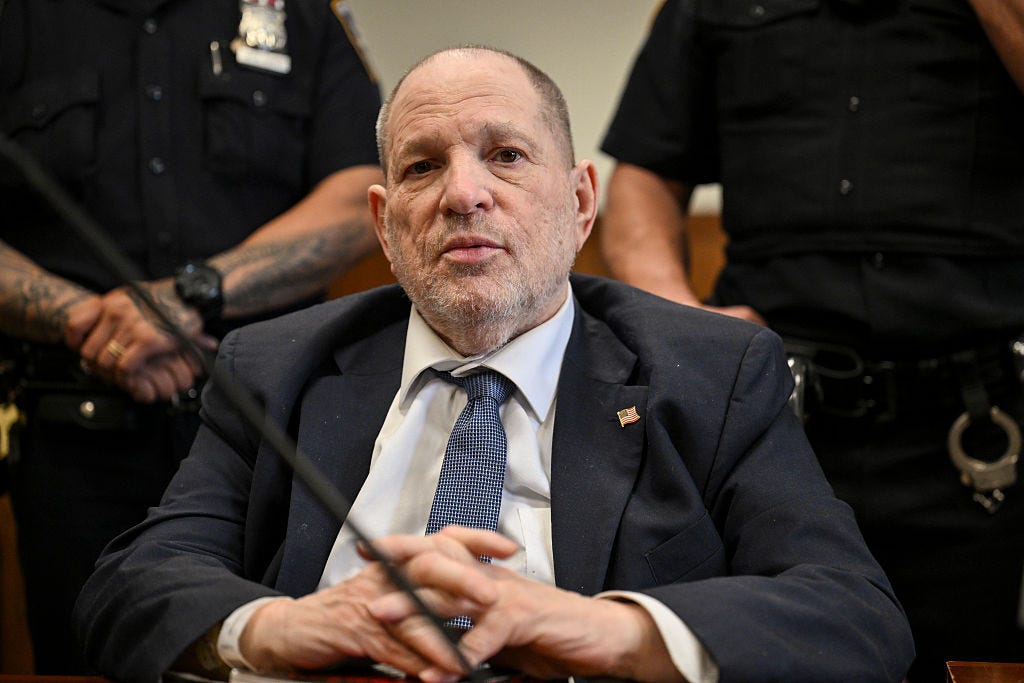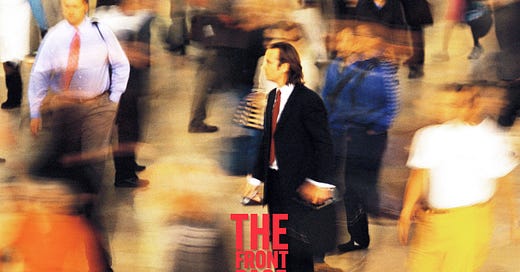
The Free Press

It’s Wednesday, April 24. This is The Front Page, your daily window into the world of The Free Press—and our take on the world at large. Coming up: Haviv Rettig Gur on the Jews who saw the Holocaust coming; the businesses plagued by tariff uncertainty; RFK Jr. seeks private health data for autism research. And so much more.
But first, Tyler Cowen asks: Is the internet good, actually?
Perhaps you’ve heard that the internet is ruining all of our lives. That online dating is stopping people from settling down, that social media is a hotbed of disinformation that drives us apart, or that we’ve all become digital drug addicts, endlessly swiping, scrolling, and squandering our precious moments on God’s green earth.
Maybe you think it’s even worse than that. In a recent New York Times column, Ross Douthat wrote that our digital age is “forcing the human race into what evolutionary biologists call a ‘bottleneck’—a period of rapid pressure that threatens cultures, customs, and peoples with extinction.” In other words, we’re scrolling our way into a literal apocalypse.
Free Press columnist Tyler Cowen takes the opposite view. He thinks there is value in an “online life,” something which, at its heart, “is deeply human”—allowing individuals to find and befriend like-minded people from all over the world.
“The internet,” he writes, “has invented a new means of human connection, characterized by ‘the perfect people for me.’ ”
Tyler acknowledges this may be an unfashionable opinion. “Perhaps you think that’s akin to admitting a heroin addiction,” he says of admitting a preference for online life. “So I ask you to challenge yourself: Don’t think about how you should spend your time. Think about how you already choose to. Be honest.”
Read Tyler Cowen on “The Case for Living Online.”
Are Trump’s Tariffs Hindering American Manufacturing?
On Tuesday, President Trump said that he believed a deal with Beijing would significantly lower the 145 percent tariffs he’s ordered on Chinese goods—just one day after a meeting with top executives at Walmart, Home Depot, and Target, who warned that the import taxes could raise prices and create chaos in supply chains.
“We’re going to have a fair deal with China,” the president told reporters. But what exactly that “fair deal” would look like isn’t entirely clear, and of course, Trump—being Trump—could change his mind again.
CEOs say it’s precisely this sort of uncertainty that makes the trade war so self-defeating.
In a new report for The Free Press, Peter Coy speaks to industry experts who say the confusion and chaos around Trump’s new tariff regime is actually stopping companies from investing in new American jobs, not incentivizing them.
“So long as uncertainty reigns,” said one chief executive, “money will stay on the sidelines.”
Read Peter’s report: “With Tariffs, It’s the Uncertainty, Stupid.”
Those Who Saw the Holocaust Coming
Today, we commemorate Yom HaShoah, known in English as Holocaust Remembrance Day, with two important essays.
The first is from Haviv Rettig Gur. He writes about the early Zionists, who were unique in foreseeing the destruction that would befall European Jewry.
In the beginning of the 20th century, Zionists were in the minority. “Most Jews,” writes Haviv, “still clung to the hope that, despite pogroms and oppressive laws, European liberalism would ultimately win out; or to the promise of universal equality trumpeted by the communists; or to the ultra-Orthodox call for a return to the physical, cultural, and spiritual safety of a renewed ghetto.”
They were wrong. The Zionists were right.
“Put very simply: Zionism, alone among Jewish movements and cultural worlds of the diaspora in the nineteenth and early twentieth centuries, knew what was coming.”
How did they see what was coming? And what can we learn from their prescience?
Read: “The Jews Who Saw Around History’s Darkest Corner.”
Is Anne Frank’s Betrayer Hiding in the Archives?

In the 80 years after its publication, Anne Frank: The Diary of a Young Girl has commanded the attention and admiration of readers all over the world. But a mystery remains at the heart of Anne’s heartbreaking story: Who turned her in?
In a new report for The Free Press, Ruth Franklin writes that a newly digitized archive in the Netherlands might help historians find the answer, but it’s also challenging the myth of a nation that protected Jews.
Read: “Who Betrayed Anne Frank? We May Now Learn the Answer.”
In Case You Missed It: Three Constitutional Law Experts Discuss the Rule of Law Under Trump
Earlier this week, we published a range of views from seven constitutional law experts on the question: Is the Trump administration acting lawlessly? All of them—across the political spectrum—agreed that the president is violating the limits of his executive power.
The piece drew a strong response from readers, so we decided to invite subscribers to dive deeper into this important issue with a livestream discussion featuring law professors Lawrence Lessig and Jonathan Adler, and Free Press columnist Jed Rubenfeld.
Watch: “Is Trump Breaking the Law? A Conversation with Jed Rubenfeld, Lawrence Lessig, and Jonathan Adler.”
These subscriber-only livestreams are just one benefit of a paid subscription to The Free Press. Subscribe today so you can tune in next time:

Opening statements in the retrial of former movie producer Harvey Weinstein—whose fall from grace spurred the #MeToo movement—began Wednesday in Manhattan. Last April, the New York Court of Appeals said Weinstein deserved a retrial for his 2020 conviction of third-degree rape and first-degree criminal sexual act. Weinstein, who is currently in prison after his conviction for separate sex crimes in California, is accused of sexually assaulting three women.
Elon Musk has pledged to “significantly” cut back his role at DOGE to one to two days per week. As a special government employee his tenure is capped at 130 days in a year, meaning it should end in late May, but Elon says he will continue working “as long as the president would like me to.” Axios reported yesterday that Musk got into a shouting match with Treasury Secretary Scott Bessent in the White House last week in a dispute over who would lead the IRS.
Illinois senator Dick Durbin, the second-highest ranking Democrat in the Senate, has announced that he will not seek reelection in 2026. Numerous Illinois Democrats have already signaled interest in the seat, including Reps. Robin Kelly, Raja Krishnamoorthi, and Lauren Underwood as well as Illinois lieutenant governor Juliana Stratton and state senator Robert Peters.
The National Institutes of Health will begin collecting private health records as part of Health and Human Services Secretary Robert F. Kennedy Jr.’s plan to discover a cause and cure for autism. The data will be gathered from pharmacy chains, hospitals, and even smartwatches.
President Trump slammed Ukrainian president Volodymyr Zelensky yesterday for stating that Ukraine will not recognize Russian control over the contested Crimean peninsula, which Russia seized in 2014. “It’s inflammatory statements like Zelensky’s that makes it so difficult to settle this War. He has nothing to boast about! The situation for Ukraine is dire—He can have Peace or, he can fight for another three years before losing the whole Country,” Trump posted on Truth Social.
The EU said yesterday that Meta and Apple were the first companies to be penalized by a new law meant to increase competition in the digital economy. Apple was fined €500 million ($570 million) and Meta was fined €200 million ($230 million) for breaking the 2022 Digital Markets Act. Apple broke the law by restricting how app developers could engage with customers about sales and other offers, according to the European Commission, and Meta violated it by imposing a system that forces users to pay for an ad-free Instagram or Facebook or else hand over their data for advertisers in order to use the sites.
On Wednesday, India blamed Pakistan for Tuesday’s militant attack in Indian-held Kashmir, which killed 26 people, and suspended a critical water-sharing treaty brokered by the World Bank in 1960. Pakistan has consistently denied that it backs Kashmiri militants.
Trump signed an executive order that will cut off federal funding to colleges and universities that fail to disclose their sources of foreign money. At least $60 billion in foreign funds have flowed to American universities in recent decades, according to a report published in March by the group Americans for Public Trust, with elite schools like Harvard, Cornell, and the University of Pennsylvania among the top recipients. Much of the money comes from wealthy Middle Eastern countries and China.










I agree with many commenters here: TFP, in order to remain free, needs to include opposing views. Otherwise it’s another NYTimes echo chamber.
Geezus. Everyday Americans live with uncertainty all the time. Maybe it's time for Wall Street to put on some big boy pants and act like adults.